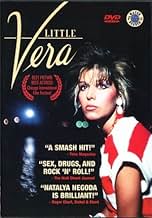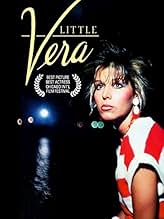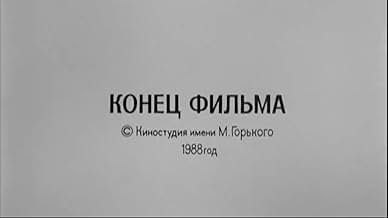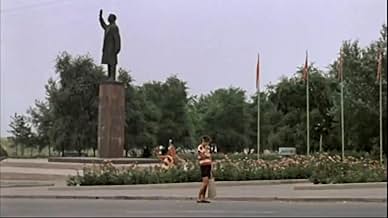Little Vera
Original title: Malenkaya Vera
- 1h 50m
IMDb RATING
6.9/10
2.3K
YOUR RATING
A teenage girl, who has just finished school feels trapped and aimless in her ordinary Russian family, supported by an alcoholic father, in a dull industrial town.A teenage girl, who has just finished school feels trapped and aimless in her ordinary Russian family, supported by an alcoholic father, in a dull industrial town.A teenage girl, who has just finished school feels trapped and aimless in her ordinary Russian family, supported by an alcoholic father, in a dull industrial town.
- Director
- Writers
- Stars
- Awards
- 7 wins & 9 nominations total
Aleksandr Negreba
- Viktor - brat Very
- (as Alexander Alexseyev Negreba)
Aleksandra Tabakova
- Lenka Chistyakova
- (as Alexandra Tabakova)
Gennady Goryachev
- Sledovatel
- (as G. Goryachev)
Vadim Zakharchenko
- Muzhchina v bolnichnoy palate
- (as V. Zakharchenko)
Mariya Khmelik
- podruga Viktora
- (as M. Khmelik)
Maksim Nayrabe
- brat Lenki Chistyakovoy
- (as Maxim Nairabe)
- Director
- Writers
- All cast & crew
- Production, box office & more at IMDbPro
6.92.3K
1
2
3
4
5
6
7
8
9
10
Featured reviews
She may have little faith, but there's lots of faith to be had in the movie.
One of the major aspects of "Malenkaya Vera" (called "Little Vera" in English) is that it was the first movie from the Soviet Union that featured a sex scene, albeit a short one. The title is important: Vera is the Russian word for "faith", identifying that punk Vera (Natalya Negoda) has little faith in the Soviet system. And as the movie shows, there's not much faith to be had in it. The opening scene shows the bleak industrial town of Zhdanov, nearly a hell on earth. When Vera's lover Sergei (Andrey Sokolov) moves in with her family, it leads to some unexpected events.
Like in many Russian movies, people's names describe their characters. For example, there's Viktor (remember that "victor" means winner). All in all, this is a good look at the Soviet Union while it was collapsing - and we can see why it was collapsing. Really good.
Like in many Russian movies, people's names describe their characters. For example, there's Viktor (remember that "victor" means winner). All in all, this is a good look at the Soviet Union while it was collapsing - and we can see why it was collapsing. Really good.
A shocking film painted in shades of decay and rust
Little Vera is the story of a Russian teenager, her family, and her attempts to find meaning and value in a life sliding increasingly into decay. In her search for meaning, she falls in love with a more intellectual and rebellious Sergei, whose hatred for her deeply flawed parents quickly spirals out of control.
Little Vera is shocking and disturbing in nearly every way. The drinking of the father, the enabling and lack of understanding of the mother, the casual lies and misdirection of the brother, and Vera herself forgiving them all their flaws are all shocking and slightly disturbing to watch. However, the raw honesty of the film somehow manages to become even more shocking than the plot or characters. Set in cramped spaces and vast urban decay, Little Vera presented a vastly different view of Soviet life than had ever been seen before. In fact, Little Vera is a portrait of the collapse of Soviet society painted in shades of pain, desperation, and rust. It is the implosion of a family set against the implosion of an entire social order.
Although painful and desperately unsatisfying, the film itself is definitely worth seeing, if only to understand the feelings and cultures still reshaping Russia today.
Little Vera is shocking and disturbing in nearly every way. The drinking of the father, the enabling and lack of understanding of the mother, the casual lies and misdirection of the brother, and Vera herself forgiving them all their flaws are all shocking and slightly disturbing to watch. However, the raw honesty of the film somehow manages to become even more shocking than the plot or characters. Set in cramped spaces and vast urban decay, Little Vera presented a vastly different view of Soviet life than had ever been seen before. In fact, Little Vera is a portrait of the collapse of Soviet society painted in shades of pain, desperation, and rust. It is the implosion of a family set against the implosion of an entire social order.
Although painful and desperately unsatisfying, the film itself is definitely worth seeing, if only to understand the feelings and cultures still reshaping Russia today.
Final years of the Soviet Union.
It's alarming, to say the least, how little the English speaking world knows about Russia's past. Everyone keeps saying Russia, but I grew up in the Soviet Union, and I can't really call it an exclusively Russian film like everyone else. Ironically, this movie was filmed in Zhdanov(Mariupol), which is now a part of Ukriane. The director chose this city because that's where he was from and he wanted to show the reality of life there. This city always been a ghetto. Now it's even worse, since that part of Ukraine is engulfed in a civil war. So the hopeless openededness of this film was right on point. Unfortunately, I have a feeling the main character would most likely die sometime in the 90's to early 2000's. Even moving wouldn't help, cause the whole area of the former Soviet Union later became a total cesspool of violent crime and drug/alcohol addiction.
During the late 80's, right before the Soviet Union collapsed, there was a plethora of similar films, but for some weird reason only this one was known outside of the country. There were films with worse sex scenes before and after this one, and unlike many other countries, there was no censorship, so TV was full of nudity at the time. So I am really confused why this was praised for a "sex scene", or "rock n' roll"(?!). This film is none of that. This era of Soviet film was actually called "Chernuha" which translates as darkness, despair, gritty. Films during this time were full of realism, had this art-house vibe and yet very genuine acting, and always had a somewhat hidden psychological or philosophical dilemma in it. Sounds like Oscar's winner Moonlight. Indeed, if Moonlight took place in the 80's Soviet Union, and instead of drugs people were drinking, it would fit right in. Some scenes are almost identical with those Soviet films. (i.e. filming a pot on a stove for a good 1 minute or so, or a character is staring at something or thinking for a long time.) I actually seen a lot of them when I was a kid, but it took me decades to watch most of them again. Many never been preserved and therefore are in a very bad shape and some I still can't find, so they were pretty much lost during the switch to the digital format. During the 90's, Russian society rejected everything from the Soviet era. Even this film would have probably been lost if it wasn't for this unusual international hype about it because of some naive sex scene.
There are some odd moments in the film that I only noticed when I watched it as an adult. There is really good and rare collector's items Italo-Disco(CC Catch) blasting from TV during the house party. A phenomena of an underground music style in North America that was only played at gay clubs, was actually a mainstream thing in the Soviet Union. Then there is a clear pedophile situation at a cafe between a man and a very young girl. Another strange scene is where Vera gets accidentally hit by a pot in the head by her drunk girlfriend with a black kid. It was also sort of disturbing to see how she was calling him names and screaming at him when she was drunk, which followed by a scene where he was alone watching a silly cartoon on TV about staying away from Africa because it has dangerous animals, while it's very obvious that life for this kid with black skin in that hell hole of a town is probably worse than being in an African jungle...
The film is as real as it gets. The life was like this for most of the Soviet Union back then. So I definitely would recommend it as a learning artifact. Also Vera means hope. So the name of the film in Russian means also "A very little hope".
During the late 80's, right before the Soviet Union collapsed, there was a plethora of similar films, but for some weird reason only this one was known outside of the country. There were films with worse sex scenes before and after this one, and unlike many other countries, there was no censorship, so TV was full of nudity at the time. So I am really confused why this was praised for a "sex scene", or "rock n' roll"(?!). This film is none of that. This era of Soviet film was actually called "Chernuha" which translates as darkness, despair, gritty. Films during this time were full of realism, had this art-house vibe and yet very genuine acting, and always had a somewhat hidden psychological or philosophical dilemma in it. Sounds like Oscar's winner Moonlight. Indeed, if Moonlight took place in the 80's Soviet Union, and instead of drugs people were drinking, it would fit right in. Some scenes are almost identical with those Soviet films. (i.e. filming a pot on a stove for a good 1 minute or so, or a character is staring at something or thinking for a long time.) I actually seen a lot of them when I was a kid, but it took me decades to watch most of them again. Many never been preserved and therefore are in a very bad shape and some I still can't find, so they were pretty much lost during the switch to the digital format. During the 90's, Russian society rejected everything from the Soviet era. Even this film would have probably been lost if it wasn't for this unusual international hype about it because of some naive sex scene.
There are some odd moments in the film that I only noticed when I watched it as an adult. There is really good and rare collector's items Italo-Disco(CC Catch) blasting from TV during the house party. A phenomena of an underground music style in North America that was only played at gay clubs, was actually a mainstream thing in the Soviet Union. Then there is a clear pedophile situation at a cafe between a man and a very young girl. Another strange scene is where Vera gets accidentally hit by a pot in the head by her drunk girlfriend with a black kid. It was also sort of disturbing to see how she was calling him names and screaming at him when she was drunk, which followed by a scene where he was alone watching a silly cartoon on TV about staying away from Africa because it has dangerous animals, while it's very obvious that life for this kid with black skin in that hell hole of a town is probably worse than being in an African jungle...
The film is as real as it gets. The life was like this for most of the Soviet Union back then. So I definitely would recommend it as a learning artifact. Also Vera means hope. So the name of the film in Russian means also "A very little hope".
rebel without a manifesto
This once notorious drama (at least in its own country) was hailed as a breakthrough when first released simply for daring to show modern Soviet life without the usual State-approved propaganda halo, in all its actual anti-bureaucratic grubbiness. But watching the film on this side of the erstwhile Iron Curtain only reinforces the notion that Soviet youth culture is thirty years behind the rest of the world: despite the often oppressive details it might be just another quaint teen delinquency relic from early 1960s Hollywood, dubbed into Russian and updated with casual sex and drug abuse. In other words, it's hardly a revelation to discover that Russian kids are just as misunderstood by adults as their American role models. But while the attitudes may look dated to Western audiences, it's at least an honest attempt to portray something of the boredom and defiant posturing of youth, in a country not exactly noted for addressing its generation gap.
Fine for a grungy indie
Vera is a rebellious daughter of dissatisfied proletariat parents. Her father Kolya is an alcoholic. They keep referring to her older brother Victor who is a success in Moscow. They don't like her lifestyle or her friends. She falls for Sergei and decides to marry. It raises the tension in the family. Sergei and and Kolya don't get along. Sergei starts living with the family but it doesn't go well in one violent drunken confrontation.
The film looks pretty grainy and weak compared to most indies of that time. It was sold as the first sex scene in Soviet cinema but there is nothing erotic about this movie. It is gritty, and dirty. The overbearing poverty is the backdrop. That is the more compelling aspect. The story of a rebellious daughter and family dysfunction is not necessarily original. It is somewhat new to see it portrayed about Russia at that time. The movie is filled with a downtrodden sadness and that goes for the lead actress Natalya Negoda. It's fine as a grungy indie and notable for being a Soviet film.
The film looks pretty grainy and weak compared to most indies of that time. It was sold as the first sex scene in Soviet cinema but there is nothing erotic about this movie. It is gritty, and dirty. The overbearing poverty is the backdrop. That is the more compelling aspect. The story of a rebellious daughter and family dysfunction is not necessarily original. It is somewhat new to see it portrayed about Russia at that time. The movie is filled with a downtrodden sadness and that goes for the lead actress Natalya Negoda. It's fine as a grungy indie and notable for being a Soviet film.
Did you know
- TriviaThis was the first Soviet film to depict graphic sexual intercourse on screen.
- SoundtracksHeaven And Hell
(uncredited)
Written by Dieter Bohlen
Performed by C.C. Catch
Produced by Dieter Bohlen
[plays during playback of the video clip of the same name C. C. Catch]
- How long is Little Vera?Powered by Alexa
Details
Box office
- Gross US & Canada
- $1,262,598
- Opening weekend US & Canada
- $23,950
- Apr 16, 1989
- Gross worldwide
- $1,262,598
Contribute to this page
Suggest an edit or add missing content

































